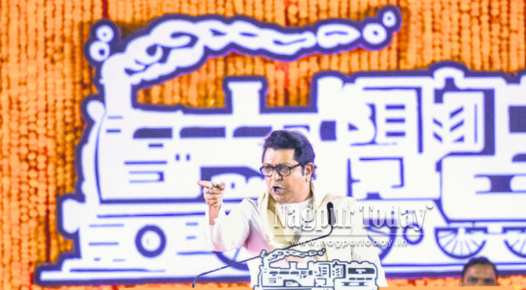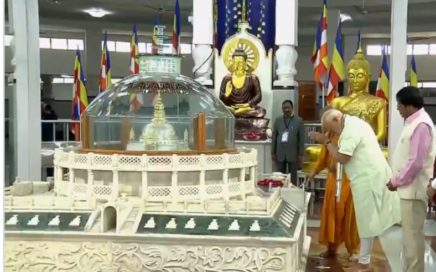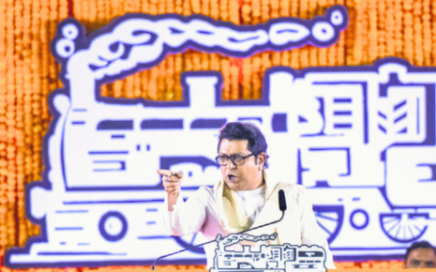 Maharashtra Navnirman Sena (MNS) chief Raj Thackeray has issued a strong message to the youth, urging them to stop relying on WhatsApp forwards for historical knowledge and instead read authentic history books. Addressing his annual Gudhi Padwa rally at Shivaji Park, Mumbai, Thackeray criticized the ongoing communal tensions surrounding Aurangzeb’s tomb and emphasized the need for a rational and informed perspective on history.
Maharashtra Navnirman Sena (MNS) chief Raj Thackeray has issued a strong message to the youth, urging them to stop relying on WhatsApp forwards for historical knowledge and instead read authentic history books. Addressing his annual Gudhi Padwa rally at Shivaji Park, Mumbai, Thackeray criticized the ongoing communal tensions surrounding Aurangzeb’s tomb and emphasized the need for a rational and informed perspective on history.
History Should Not Be Seen Through the Lens of Caste and Religion
Thackeray condemned the recent demands by right-wing outfits for the removal of Aurangzeb’s tomb in Chhatrapati Sambhajinagar district. The protests over the issue had even led to violence in Nagpur earlier this month. He warned against attempts to incite communal discord, asserting that history should not be interpreted through the prism of caste and religion.
“The Mughal ruler wanted to ‘kill a thought called Shivaji’ but failed and died in Maharashtra,” he stated, reinforcing the Maratha legacy. He also pointed out that Afzal Khan, the Bijapur general, was buried near Pratapgadh Fort, it couldn’t have been done without Chhatrapati Shivaji Maharaj’s permission, he said, underlining a historical fact that needs to be acknowledged.
A Call for Awareness and Avoiding Distractions
Expressing his concerns about misplaced priorities, Thackeray urged people not to get provoked by political distractions. “We have forgotten the real issues of the present time. Hindus who feel awakened after a movie are of no use. Did you learn about Sambhaji Maharaj’s sacrifice because of Vicky Kaushal and about Aurangzeb because of Akshaye Khanna?” he asked, referring to the recently released historical drama ‘Chhaava’ based on Chhatrapati Sambhaji Maharaj’s life.
He also reminded people that Aurangzeb was born in Dahod, Gujarat, and accused those instigating unrest of exploiting history for political gains rather than genuine historical discourse.
Religion and Governance: The Turkey Example
Thackeray strongly criticized the use of religion in governance, citing Turkey as an example of a nation that successfully reformed itself. “A country cannot progress on the basis of religion. Religion should remain within the four walls of your home. A Hindu identifies as a Hindu only when Muslims take to the streets or during riots; otherwise, Hindus are divided by caste,” he said, calling for a more united and progressive mindset.
Concerns Over Government Schemes and Marathi Language Use
The MNS chief also took a jab at the BJP-led government’s popular ‘Mukhyamantri Majhi Ladki Bahin’ scheme, predicting its discontinuation. “I told you earlier, but you believed them and not me,” he remarked, addressing the government’s failure to increase financial assistance under the scheme from ₹1,500 to ₹2,100 as promised.
He reiterated his stance on making Marathi mandatory for official purposes, issuing a warning: “If you live here and don’t speak the language, you will be dealt with appropriately.”
Environmental Issues: The State of Rivers in Maharashtra
Beyond politics, Thackeray also voiced concerns about environmental degradation, particularly river pollution. He showed a video allegedly depicting bodies being dumped into the Ganga and questioned religious practices that harm natural resources. “What kind of religion is this if we destroy our natural resources? ₹33,000 crore has been spent on cleaning the Ganga, and it is still polluted. Shouldn’t we reform ourselves?” he asked.
Highlighting Maharashtra’s water pollution crisis, Thackeray revealed that 55 of the 311 most polluted river patches in India are in Maharashtra. He lamented the loss of Mumbai’s rivers, stating that out of the five original rivers, four have already been destroyed, with the lone surviving river, Mithi, on the brink of death due to sewage, encroachments, and chemical waste.
A Powerful Message for the Future
Raj Thackeray’s speech was not just a political critique but also a call for societal introspection. From urging historical awareness to advocating for environmental responsibility and the preservation of Maharashtra’s linguistic and cultural identity, he delivered a powerful message that resonated with many. His advice to stop consuming history through WhatsApp forwards and instead turn to legitimate sources is a reminder of the need for an informed and rational society.
















